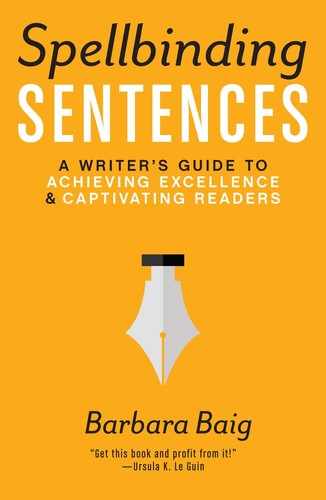Section 1
The Mastery Path
Mastery is the mysterious process during which what is at first difficult becomes progressively easier and more pleasurable through practice.
—George Leonard, Mastery: The Keys to Success and Long-Term Fulfillment
What makes certain people really good at using language? What gives them the ability to choose just the right words, to craft pieces of writing made up of one eloquent sentence after another?
Most of us are sure we know the answer to these questions: innate talent—a natural ability so powerful that success in a particular field comes effortlessly. Whenever we encounter people who are great at what they do—be they writers or musicians, athletes or inventors—we assume they were born with their abilities. Most aspiring writers look at the work of great authors, sigh, and say, “I wish I had that kind of talent.”
But in the scientific field of expertise studies, researchers have been demonstrating, over and over, that natural talent is a myth. They’ve studied chess players and writers, artists and firefighters, tennis players and violinists and nurses, and people in many other fields—and in none of these studies did they find evidence of anyone who was “born great” at some activity.
Professor K. Anders Ericsson, the preeminent researcher in the field of expertise studies, has spent decades studying people who achieve greatness. He concludes that genius or expertise “isn’t magic, and it isn’t born. It happens because some critical things line up so that a person of good intelligence can put in the sustained, focused effort it takes to achieve extraordinary mastery.”1…to achieve extraordinary mastery. Professor K. Anders Ericsson, quoted in Dodds, David, “E=MC2,” The Age, 2006. Those “critical things” include getting started early in life, finding great teachers—and practice, practice, practice.
Few of us have the good fortune to find our chosen path early. But no matter how old we are, we all can make use of the powerful learning tool of practice. Practice quite literally changes our brains. That’s because the human brain has an important characteristic known as its “plasticity”—its “built-in capacity to become, over time, what we demand of it.”2…what we demand of it. David Shenk, The Genius in All of Us, p. 30. When we engage in practice under the guidance of a knowledgeable coach, as top musicians and athletes do, new neural connections are created in our brains; we become able to do things that we could not do before.
These days, many aspiring writers are held back from achieving their potential because they’ve been told, “Just keep writing. Eventually you’ll get better.” This simply isn’t true. No amount of just swinging the bat will turn someone into a major-league baseball player. No amount of singing in the shower will make someone a professional opera singer. If you want to become great—or even just good—at an activity, you need a teacher or coach to show you the skills you need to practice—and then you must practice them, over and over, and over. In doing so, you leave the myth of innate talent far behind, and instead you set your feet on the path to mastery.
In Chapter 1, I explain how I developed my practice-based approach to writing instruction. Then I turn to what practice really is and how to get the most out of doing it. If you want to start practicing right away, Chapter 3 sets out a group of basic practices that will launch you on your learning journey.
